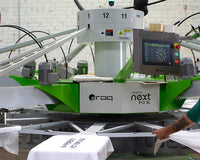Have you ever examined the basic core expectations of customer service in your shop? From your customer’s point of view how do you think your shop rates on these fundamental ideas? This is important, as how you treat your customers and the lens that they view your business is an incredibly critical component to long term success.
Knowledge
Customer service is based on helping your customer solve a challenge. Maybe they are just initially placing an order, or following up trying to get a tracking number for something that’s shipped. People have questions and they want answers.
Are you ready? Can you easily get them a price quote? Can you send them a tracking number? Or better yet, do you have an automated system that forwards them the tracking number as soon as their order ships?
Can anyone in your company answer their question? Do you cross train your staff to know what to do when a customer asks a question? If they don’t know the answer, can they find it easily?
This is important, as I know you’ve been on the other line when a customer service rep fumbles their way through the task of finding a simple answer. It’s excruciating sometimes.
So what makes a rep go from a bumbling stooge to a rock star in the eyes of your customer? Training. A good information system. Experience. A great support system. Your customers want fast, accurate and complete answers. Are you ready to support them?
Trust
Trust is established over time. However trust can be gained instantly with the professionalism in how you present things to your customer. The aesthetics of your website. How you brand yourself on social media. The responsiveness and accuracy of your staff. Details matter when building trust.
Why is trust important in customer service? Because without it, your customer’s natural inclination will be to keep searching.
So when your website doesn’t load, or when they click on “request a quote” and they go to a page still under construction, the customer will just go to another shop for their order.
When you tell a customer you’ll get back to them with the information, but you don’t remember until four days later, you aren’t doing yourself any favors.
Trust in customer service is built when you do what you say you are going to do. Sending that quote on time, with all the information…and even a few more details that weren’t asked; that builds trust. For example, it’s not enough to just send a quote with a price. If you send a quote, but have also checked inventory levels with your distributors, and state that if you order the shirts today the job can still ship so the customer can receive the order on Tuesday, that’s much better.
If your customer doesn’t like your answer or how you present it to them, they may just go out and find another shop. However, if the answers are presented to them professionally, with good information, and friendly, quick customer service that builds the basis of trust needed to close the deal on the order.
Personality
Personality they say, goes a long way. I agree. The absolute best customer service people are at ease with themselves. Nothing is ever forced. They are pleasant to talk to, humorous in their approach, and sincere in their delivery.
This is a trait that can’t be taught. It just comes down to who the person is deep down inside. If you think about your best or favorite interactions with people in a professional setting, I’ll bet one or two really stick out in your mind. That could be why you do business with that company. Just so you can deal with that person. Maybe it’s disappointing when they aren’t there that day. That connection is that strong.
Now think about who is doing the talking in your company. Who are you letting your customers interact with on a daily basis? Are there any there any problems? Complaints? How about thank you letters or notes?
Proactiveness
This is huge. Awesome customer service people can think ahead. They want to check to make sure everything is ok.
They follow up to make sure that the delivery is on track. They review the details of the order and ask good questions. What could go wrong? What needs to happen, and in what order?
They also check up on all orders in their queue often. Any challenges? Did that art get approved? Did those mediums ever get delivered? If something doesn’t look right, they will investigate. By phone, email or by getting up out of their chair and asking.
What do you think happens when your customer service team contacts a client and outlines a potential challenge, offers a suggestion on how to solve it, and asking the client’s opinion about the situation? People get thrilled when this happens, as it’s not common usually. This level of service always counteracts the low price point argument your competitors are always shoving down everyone’s throats. When you have great customer service relationships, a slightly lower price doesn’t matter as much.
Details Matter
The devil is always in the details. Great customer service people have to have the ability to comprehend what’s needed and read a purchase order, email or work order thoroughly. If something gets missed, this potentially could be a gigantic problem.
Getting the details right may mean slowing down. Make some notes on a scratch pad. What does this mean? What does this say? Great reps get the details right as they practice good reading habits. If on the phone, they make notes on a pad or in the computer while the customer is talking. Then they read back what the customer said to ensure it is correct.
For customer service reps one thing to constantly remember is that other people in your shop will make work decisions based on the information you enter into the system. If you enter quantities in the wrong column, that can have an effect on purchasing and receiving. If you don’t describe what the customer wants on the shirt in detail, that could mean a lot of revisions for the art team. If you forget to detail that the shirt is 100% polyester, the wrong ink could be used to print. A simple trick is to create a short checklist of the things that need to be correct on each order, and then after order entry, review to see that they are perfect.
Takeaways:
1. Training matters. Have your customer service team spend time in each department so they can understand how they work, how decisions are made, and what they need to do their jobs correctly.
2. Double check your work for accuracy.
3. Have company branded information available that you can hand or send to a customer at the ready. This includes pricing, but also art guidelines, industry references and terms, articles of interest, or even your company newsletter.
4. Customer service should be friendly and informative. Some people don’t have the right personality.
5. Ask your customers what they think. How can you improve? What don’t they like?





